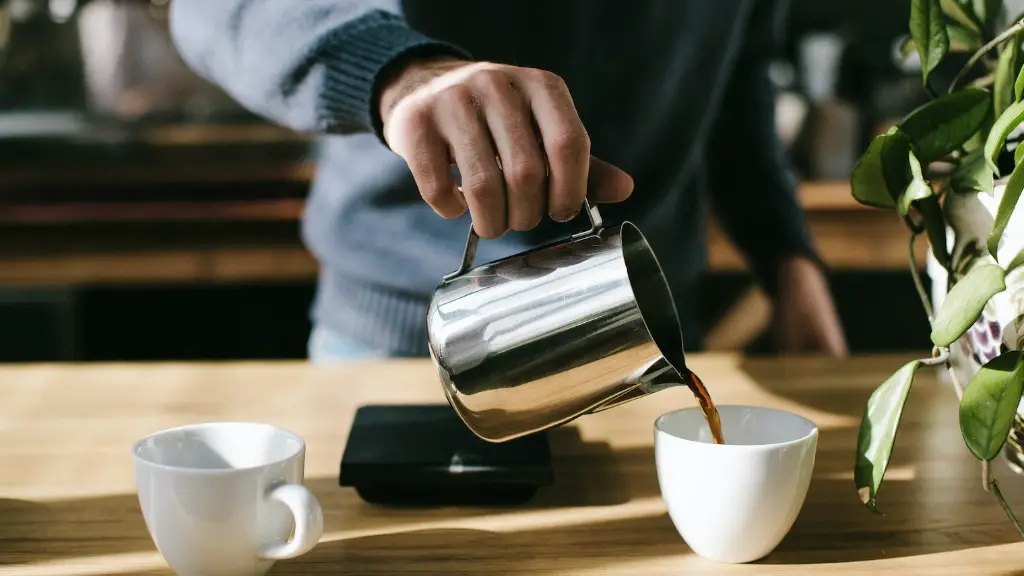Health Effects
Coffee is one of the most popular and widely consumed beverages in the world. It contains caffeine, which is a stimulant that increases alertness and helps people stay focused. But consuming too much caffeine can have negative effects on the body. So, what happens if you drink only coffee?
The Centers for Disease Control and Prevention recommends an adult consume no more than 400 milligrams of caffeine a day – the equivalent of four to five cups of coffee. Consuming more than that can lead to restlessness, insomnia, irritability, stomach upset, and other uncomfortable symptoms. Long-term use of large amounts of caffeine can even lead to an increased risk of heart disease, diabetes, and certain cancers.
Considering coffee is a diuretic, it can also cause dehydration, as it can increase your urinary output. Long-term coffee consumption can lead to impaired kidney function, and in severe cases, kidney failure. It can also increase the risk of developing kidney stones, as it can increase the amount of calcium and oxalate in the urine.
Nutritional Deficiency
Drinking coffee all day can also lead to nutritional deficiencies. One of the main components of coffee, theobromine, can interfere with the absorption of certain vitamins and minerals in your body, such as Vitamin B and magnesium. Even if you’re drinking coffee with milk, it may not have enough nutritional value to replace the vitamins and minerals you need. Coffee also contains oxalates, which can bind to important minerals and make them less available to your body.
Coffee can also upset your stomach and reduce your appetite. If you’re not eating enough healthy food, you could experience nutritional deficiencies, such as anemia and weakened immune systems. Plus, if you’re drinking coffee all day, you may not be getting enough water, which can further lead to nutritional deficiencies.
Mental Health
The high levels of caffeine in coffee can also cause mental health problems. In some people, too much caffeine can lead to higher levels of anxiety and make it more difficult to concentrate and stay calm.
On the other hand, caffeine in coffee can also stimulate dopamine and enhance mood. A moderate amount of coffee can lead to better alertness and concentration. But if you’re drinking too much coffee, the effects can become overwhelming.
Caffeine Addiction
If you’re drinking too much coffee, you may become dependent on it. Caffeine can become addictive and withdrawal from it can be uncomfortable. Symptoms include headache, fatigue, lack of concentration, and irritability. Additionally, frequent coffee consumption can increase your tolerance to caffeine, so you might need more and more to get the same effect.
What You Should Do
Coffee is an enjoyable and natural beverage and can have some health benefits in moderation. But drinking too much can have negative effects on your health and mental wellbeing. If you think you may be drinking too much coffee, it’s important to cut back and take steps to make sure you’re getting all the vitamins and minerals you need.
You don’t have to give up coffee completely. Just make sure you only drink it in moderation and not as a substitute for a healthy and balanced diet. Try to drink other drinks too, such as water, tea, juices and smoothies, and make sure you eat plenty of fresh, nutritious food.
Sleep Patterns
Coffee can also have detrimental effects on your sleep patterns, as the stimulating effects of caffeine can remain in your system up to ten hours after drinking it. Drinking too much coffee late at night can make it difficult to fall asleep, and even if you manage to drift off, you may not get a good quality of sleep.
It’s important to consider when you’re drinking coffee too. Try to limit your caffeine intake to the morning and early afternoon, and avoid drinking it late in the evening. This will help you get the most out of your sleep and help you wake up feeling rested and energized.
Cardio-vascular Effects
Drinking large amounts of coffee can also have damaging effects on your cardiovascular system. Caffeine can raise your blood pressure and increase your heart rate, which can increase your risk of heart disease. Additionally, if you already have high blood pressure or heart problems, drinking too much coffee can increase your risk of stroke and other cardiovascular issues.
Therefore, if you have any underlying heart conditions, it’s important to check with your doctor before drinking too much coffee. It may be best to avoid caffeine altogether and switch to decaffeinated coffee or herbal tea instead.
Cancer Prevention
Despite the potential deleterious effects of coffee, it may also have some beneficial properties. Recent research suggests that coffee may help reduce the risk of developing certain types of cancers, such as prostate and colon cancer. This is thought to be due to the antioxidants found in coffee.
It can also help reduce the risk of liver cancer and is thought to help protect against Alzheimer’s disease. The exact mechanisms are still unclear, but coffee is thought to have anti-cancer and anti-inflammatory benefits.
Weight Loss
Coffee can also be used as a tool for weight loss. The caffeine in coffee increases fat burning and can help to boost metabolism. Drinking coffee can also help to suppress your appetite, so you eat less throughout the day.
However, it’s important to note that drinking coffee alone won’t lead to significant weight loss. You need to combine it with a healthy, balanced diet and plenty of exercise to see results.
Side Effects
Overall, while coffee can have some health benefits, it can also have some undesirable effects. Some side effects from drinking too much coffee include restlessness, insomnia, irritability, stomach upset, dehydration, nutritional deficiencies, and higher levels of anxiety. It can also increase your risk of stroke and other cardiovascular issues, and become addictive, so it’s important to drink in moderation.
Coffee should not be consumed as a substitute for a healthy and balanced diet. For the best results, it’s important to drink coffee moderately, preferably before the mid-afternoon, and combine it with a nutritious diet and plenty of exercise.


